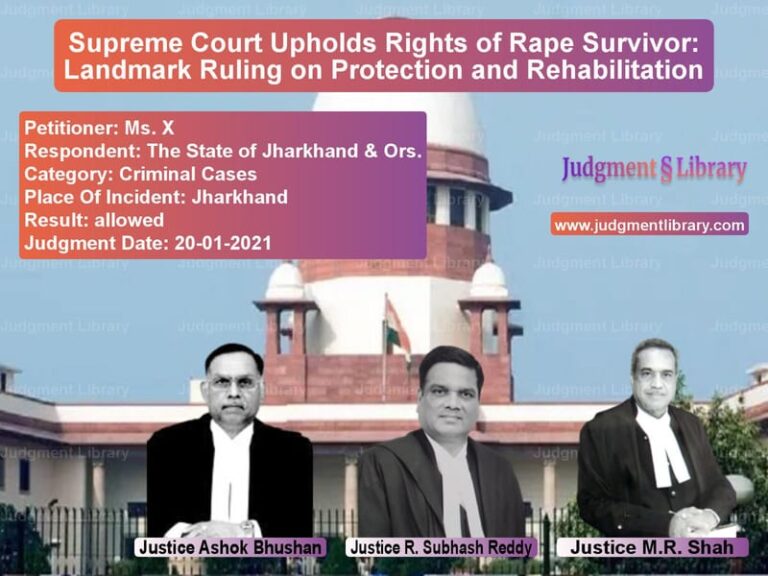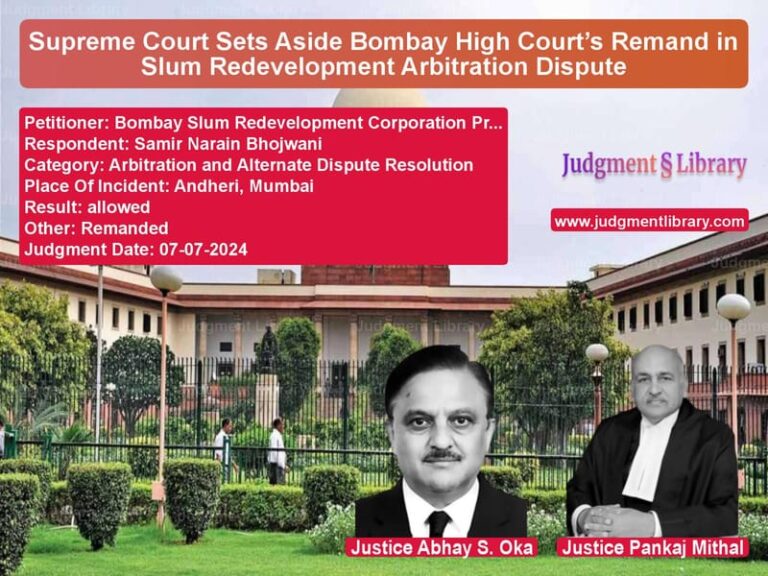Supreme Court Rules That One-Time Settlement Cannot Be Claimed as a Right
The case of The Bijnor Urban Cooperative Bank Limited vs. Meenal Agarwal & Others revolves around whether a borrower can claim the benefit of a One-Time Settlement (OTS) as a matter of right. The Supreme Court ruled that banks have the discretion to grant or deny OTS benefits based on their own assessment of recovery possibilities, emphasizing that courts cannot compel financial institutions to provide OTS relief to defaulters.
Background of the Case
Meenal Agarwal, the respondent in the case, had obtained a loan of Rs. 1 crore from Bijnor Urban Cooperative Bank Limited. Due to non-payment, the loan account was classified as a Non-Performing Asset (NPA). The bank initiated recovery proceedings under the Securitization and Reconstruction of Financial Assets and Enforcement of Security Interest (SARFAESI) Act, 2002.
In an attempt to settle the outstanding dues, the respondent applied for an OTS scheme introduced by the bank. However, her application was rejected on the grounds that:
- Her loan was fully recoverable through the auction of the mortgaged property.
- She did not meet the eligibility criteria for OTS.
Despite this rejection, the respondent continued to seek OTS relief. After depositing Rs. 60 lakhs to attempt to improve her eligibility, she approached the Allahabad High Court through a writ petition. The High Court directed the bank to positively consider her OTS application, leading the bank to challenge this order before the Supreme Court.
Legal Issues
- Can a borrower demand an OTS as a matter of right?
- Does the High Court have the authority to issue a writ compelling a bank to approve an OTS?
- What is the extent of judicial interference in banking policies?
Arguments by the Parties
Arguments by Bijnor Urban Cooperative Bank (Appellant)
The bank contended that:
- OTS is a discretionary relief provided under specific conditions, not an enforceable right.
- The bank had evaluated the loan and determined that it could be fully recovered through auction.
- It had already given the respondent a fair opportunity by reviewing her application multiple times.
- The High Court’s interference was unwarranted as financial institutions should have autonomy in deciding settlement policies.
Arguments by Meenal Agarwal (Respondent)
The respondent argued that:
- She was willing to clear her dues through the OTS scheme.
- The bank had unfairly rejected her request despite her deposit of Rs. 60 lakhs.
- By accepting her deposit, the bank had implicitly agreed to consider her OTS application.
- The rejection was arbitrary and motivated by an intention to seize her mortgaged property.
Supreme Court’s Ruling
OTS Cannot Be Claimed as a Right
The Supreme Court held that the OTS scheme is not a fundamental right and that borrowers cannot compel banks to accept their settlement proposals.
“No borrower can, as a matter of right, pray for grant of benefit of One-Time Settlement Scheme. The decision to grant or reject OTS is the sole discretion of the bank.”
Banks Have Discretion in Recovery Methods
The Court emphasized that financial institutions are best suited to decide how to recover outstanding dues. If a bank determines that auctioning the mortgaged property will result in full recovery, it is justified in rejecting an OTS application.
“The bank is justified in refusing OTS if there is a possibility of recovering the entire loan amount through auction of the mortgaged property.”
Judicial Intervention in Banking Policies
The Court criticized the High Court for exceeding its jurisdiction by compelling the bank to grant an OTS:
“The High Court erred in issuing a writ of mandamus directing the bank to positively consider the application for OTS. Courts should not interfere in the commercial wisdom of financial institutions.”
Final Judgment
The Supreme Court allowed the appeal and set aside the High Court’s ruling, stating:
- The bank had acted within its rights by rejecting the OTS application.
- The respondent was not entitled to relief under the OTS scheme.
- The decision of the bank’s Settlement Advisory Committee was final and not subject to judicial interference.
Key Takeaways from the Judgment
- OTS is not a right: Borrowers cannot demand settlements as an entitlement.
- Banks have full discretion: Financial institutions can reject OTS applications if loan recovery is feasible through other means.
- Judicial overreach is discouraged: Courts should not interfere in commercial decisions of banks unless there is a clear violation of law.
- Depositing partial payments does not guarantee OTS approval: The bank’s acceptance of a deposit does not obligate it to grant OTS.
- SARFAESI Act remains a valid recovery tool: If banks can recover dues through asset auctions, they are justified in rejecting settlement requests.
Conclusion
The Supreme Court’s judgment clarifies the legal position on OTS schemes and bank discretion in loan recovery. It upholds the autonomy of financial institutions in deciding recovery methods and prevents borrowers from using OTS as a tool to escape full repayment obligations. This ruling will serve as a precedent in cases where defaulters attempt to enforce settlements through litigation.
Petitioner Name: The Bijnor Urban Cooperative Bank Limited.Respondent Name: Meenal Agarwal & Others.Judgment By: Justice M.R. Shah, Justice B.V. Nagarathna.Place Of Incident: Bijnor, Uttar Pradesh.Judgment Date: 15-12-2021.
Don’t miss out on the full details! Download the complete judgment in PDF format below and gain valuable insights instantly!
Download Judgment: the-bijnor-urban-coo-vs-meenal-agarwal-&-oth-supreme-court-of-india-judgment-dated-15-12-2021.pdf
Directly Download Judgment: Directly download this Judgment
See all petitions in Bankruptcy and Insolvency
See all petitions in Corporate Compliance
See all petitions in unfair trade practices
See all petitions in Judgment by Mukeshkumar Rasikbhai Shah
See all petitions in Judgment by B.V. Nagarathna
See all petitions in allowed
See all petitions in Quashed
See all petitions in supreme court of India judgments December 2021
See all petitions in 2021 judgments
See all posts in Corporate and Commercial Cases Category
See all allowed petitions in Corporate and Commercial Cases Category
See all Dismissed petitions in Corporate and Commercial Cases Category
See all partially allowed petitions in Corporate and Commercial Cases Category







